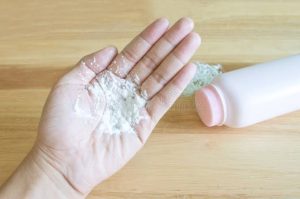Thousands of Women in the UK Take Legal Action Over Talcum Powder and Cancer Links
A growing number of women across the UK are planning to take legal action against Johnson & Johnson (J&J) over claims that the company’s talcum powder products are linked to various types of cancer, including ovarian and mesothelioma. This action, which could become the largest pharmaceutical product group action in English and Welsh legal history, follows decades of allegations that J&J’s baby powder products were contaminated with asbestos, a known carcinogen.
Among those leading the legal charge is Cassandra Wardle, who was diagnosed with ovarian cancer in 2021. Cassandra, like many others, was a long-time user of talcum powder, a product she believed was safe for everyday use. She used it for more than 20 years, having grown up with the powder being used on her as a child. “You mimic your mum who used it,” she recalls. “Baby powder was supposed to be something deemed ‘safe to use’, even on a baby’s bum.” It was only after her cancer diagnosis that she came across a Facebook article linking talc to cancer, which spurred her to take action.
Cassandra is now one of 1,900 potential claimants, including cancer patients, survivors, and families, who are challenging the multinational corporation. Lawyers allege that for decades, J&J’s talc was contaminated with asbestos, something they claim the company was aware of but chose to conceal. J&J has repeatedly denied these claims, insisting that its baby powder is safe and free from asbestos. The company has also stated that any suggestion it concealed information about the safety of talc is false.
The allegations surrounding the use of talcum powder and cancer have sparked widespread outrage among women like Cassandra, who feel they were misled about the safety of the product. “I was just starting my chemo journey when I read about the links, but I felt enraged that a corporate giant like J&J could seem to do this,” she says.
The Impact of Talcum Powder on Health
The controversy centers on the possibility that J&J’s talc-based products, which have been widely used for decades, may have been contaminated with asbestos. Asbestos is a substance known to cause serious health issues, including lung cancer, mesothelioma, and ovarian cancer. Talc is a mineral that can sometimes be found in close proximity to asbestos in the ground, which can lead to contamination during mining. Despite the risks, many consumers continued to use talcum powder without awareness of the potential harm.

Sharon Doherty, a 57-year-old woman from Derry, is another claimant in the legal action against J&J. Sharon, who was diagnosed with both ovarian and fallopian cancer in 2020, believes her cancer was caused by her long-term use of talcum powder. She, too, grew up using talc after baths, following the example set by her mother. “My mum would use the talcum powder on us all after a bath, and I continued to do so as I got older,” Sharon explains. Despite undergoing surgery and chemotherapy, Sharon’s cancer has since returned, prompting her to join the lawsuit.
Many of the women involved in the legal action say they have been devastated by the impact of their cancer diagnoses. Deborah, a woman from Derbyshire who was diagnosed with ovarian cancer at 29, experienced a full hysterectomy within weeks of her diagnosis. “I went from excitedly planning for a baby to having all of my parts removed,” she recalls. For Deborah, the decision to pursue legal action is also about holding J&J accountable for what she feels was an avoidable tragedy. “If they knew, they shouldn’t have been doing it,” she says, referring to J&J’s alleged awareness of the potential risks of asbestos contamination in its products.
The Legal Battle Against Johnson & Johnson
KP Law, a firm representing around 2,000 claimants with an additional 4,000 potential clients, is leading the legal charge in the UK. The firm has already issued a letter before action to J&J, demanding that the company respond by the end of the year. If the action proceeds, it would be the first of its kind against the pharmaceutical giant in the UK.

Tom Longstaff, a partner at KP Law, emphasizes the gravity of the claims. “All of the claimants, predominantly women but also some men, who have sustained cancer after using J&J’s talcum powder products have experienced a life-changing illness,” he says. “In some cases, they have died from their cancer, leaving their families devastated. All of these innocent individuals deserve justice.”
However, J&J remains adamant that its talc-based products are safe. Erik Haas, worldwide vice president of litigation at J&J, has stated that the company has always adhered to the highest safety standards, relying on state-of-the-art testing protocols and being fully transparent with government institutions and researchers. “Independent science makes clear that talc is not associated with the risk of ovarian cancer nor mesothelioma,” Haas asserts.
Despite the company’s denials, the legal action is gaining momentum. J&J announced in August 2022 that it would cease production of talc-based baby powder worldwide, transitioning to cornstarch-based alternatives. This move followed years of lawsuits and media scrutiny regarding the safety of talc products. In the UK, the company stopped selling talc-based baby powder in 2023.
A Pivotal Moment for Consumer Safety
As the legal action unfolds, it brings to light the broader issue of consumer safety and corporate accountability. Many of the women involved in the lawsuit feel betrayed by J&J’s failure to adequately warn consumers about the potential risks associated with its products. For them, this legal battle is not just about seeking compensation, but about holding a powerful corporation accountable for the harm it may have caused to thousands of people.
The legal proceedings are expected to have significant implications for both consumer safety and corporate responsibility. If the case goes to trial, it will not only represent a challenge to J&J’s practices but also serve as a wake-up call for other companies regarding the importance of transparency and accountability when it comes to consumer health.
As women like Cassandra, Sharon, and Deborah continue to fight for justice, their stories serve as a powerful reminder of the need for vigilance and regulation in industries that directly impact public health. Whether or not the legal action succeeds, it is clear that the debate surrounding the safety of talcum powder and other cosmetic products will continue to shape discussions about consumer protection for years to come.


